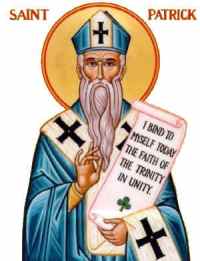
Each year on March 17, Irish people the world over celebrate the feast of St. Patrick. His own life seems to fade out of the picture now, with the emphasis on a St. Patrick’s Festival, accompanied by much light-heartedness, greenness and Guinness. A big coup for Ireland seems to be the “greening” of iconic buildings elsewhere, such as the Sydney Opera House. However all this misses the whole point of St. Patrick’s significance.
Think about it. Patrick, son of a Roman citizen in Wales, and himself a Roman citizen – one of the greatest claims to glory in the ancient world – is somehow captured by pirates off the west coast of England, bound with ropes, brought to Ireland and sold as a slave. In the year 432. As an educated young man he would not have been used to real hardship, but he found himself out in the fields in cold, bare countryside, minding sheep. He did not know where he was and could not speak the strange language he heard all around him. He had no way of communicating his whereabouts to his family. He was habitually cold and half starved. He was lonely, but determined to survive somehow, and escape if at all possible. He found himself praying constantly, night and day, and having endured six years of slave labour, he heard a voice instructing him to travel to a certain place where a foreign boat had anchored, and so he escaped. The journey wasn’t easy, however, and Patrick was captured a second time, but only for two months, after which he was able to return to his family. Despite the trauma of his captivity he returned later as a bishop giving his heart and soul and all his strength tor the rest of his life to preaching the good news of Jesus Christ, Son of God to the Irish, including the High King. This is the man we celebrate on March 17. A great Christian apostle in the tradition of St. Paul.
But I wonder how many of us, hearing Patrick’s story, perhaps for the first time, or maybe for the umpteenth time, would think of today’s asylum seekers? Or wonder if slavery still exists?
Slavery does exist today, and asylum seekers themselves live in a form of slavery, in that their lives are strictly regulated. Alone of all EU states, Ireland does not allow asylum seekers to work, so for the years during which they live in a limbo, they may not engage in paid work. Many say they had no idea where they were going when they managed to escape their own countries in fear of their lives. The majority of those who reach the North African coast hand over very large sums of money and are forced to embark on leaky boats across the Mediterranean. Many don’t speak the language if and when they arrive. All of them suffer culture shock as well as the trauma of their departure. They don’t really want to be here. They did not choose such a life. For the men in our Direct Provision sustem, there is the added suffering of being unable to fulfil the role they would have expected to fulfil: work, earn money to support their families. Live with dignity. For mothers, the suffering of being unable to carry out the basic tasks of motherhood: have a home where they can cook, and feed their own children; for the children they have no places to play, they can’t go for “sleepovers” to friends’ homes, nor can they have friends to visit them. They have no childhood.
We need to keep reminding ourselves who are those people who come to claim asylum, and why. And why the numbers have risen in the past year. Each individual is someone’s son or daughter, or spouse. They may be unaccompanied children. Wherever there is grave injustice, wherever governments abuse their power, silence democratic opposition, trample on peoples’ rights, then life can become so unbearable and even dangerous that people will leave. When democratic, non-violent opposition is oppressed and the voice of protest is choked off, as in many places where journalists are either killed or imprisoned, and popular organisations are violently suppressed, as the TV has shown again and again over the years, then as a last resort, many will flee. Instead of erecting a new wall around Europe, cutting down on boat rescues in the Mediterranean in the hope that this will stop people leaving Africa, (the new EU approach which is shameful and utterly immoral) we in the host countries should be doing our utmost to provide emergency aid and to tackle the causes of migration. Building more walls will not deter desperate people. Contributing to making life in their own countries more liveable, will enable people to have a choice to remain, or to return home if they have left.
St Patrick the foreigner who came to live among use is now an accepted part of the identity, culture and Irishness we celebrate on the 17th of March. What about the foreigners who live among us today? Will they be accepted, will their children be Irish? The answers to these questions lay both with us Irish and also with the immigrants. Both have to be accepting and open and welcoming. Cead Mile Failte
